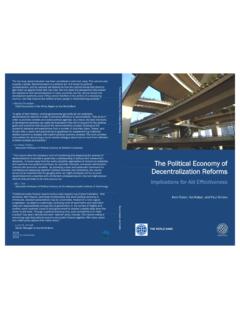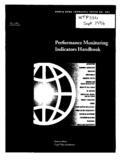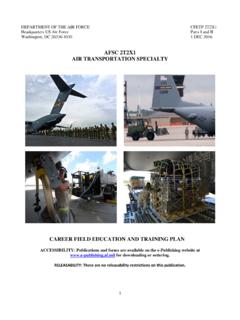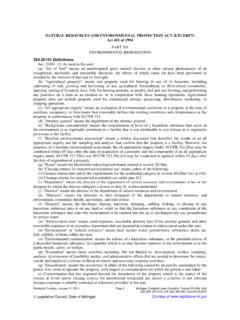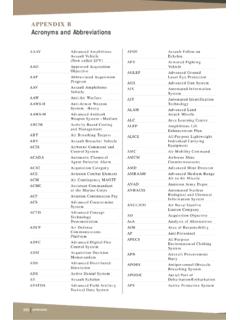Transcription of Governance, Management, and Accountability in …
1 governance , management , andAccountability in SecondaryEducation in Sub-Saharan AfricaTHE WORLD BANKWORLD BANK WORKING PAPER NO. 127 AFRICA HUMAN DEVELOPMENT SERIESWORLD BANK WORKING PAPER NO. 127 governance , management , and Accountability in secondary Education in Sub-Saharan AfricaTHE WORLD BANKW ashington, Education in Africa (SEIA)Africa Region Human Development 1/16/08 12:48 PM Page iCopyright 2008 The International Bank for Reconstruction and Development / The World Bank1818 H Street, , 20433, rights reservedManufactured in the United States of AmericaFirst Printing: January 2008printed on recycled paper1 2 3 4 5 10 09 08 07 World Bank Working Papers are published to communicate the results of the Bank s work tothe development community with the least possible delay. The manuscript of this paper thereforehas not been prepared in accordance with the procedures appropriate to formally-edited sources cited in this paper may be informal documents that are not readily findings, interpretations, and conclusions expressed herein are those of the author(s)and do not necessarily reflect the views of the International Bank for Reconstruction andDevelopment/The World Bank and its affiliated organizations, or those of the ExecutiveDirectors of The World Bank or the governments they World Bank does not guarantee the accuracy of the data included in this work.
2 Theboundaries, colors, denominations, and other information shown on any map in this work donot imply any judgment on the part of The World Bank of the legal status of any territory orthe endorsement or acceptance of such material in this publication is copyrighted. Copying and/or transmitting portions or allof this work without permission may be a violation of applicable law. The International Bankfor Reconstruction and Development/The World Bank encourages dissemination of its workand will normally grant permission promptly to reproduce portions of the permission to photocopy or reprint any part of this work, please send a request withcomplete information to the Copyright Clearance Center, Inc., 222 Rosewood Drive, Danvers,MA 01923, USA, Tel: 978-750-8400, Fax: 978-750-4470, other queries on rights and licenses, including subsidiary rights, should be addressed tothe Office of the Publisher, The World Bank, 1818 H Street NW, Washington, DC 20433, USA,Fax: 202-522-2422, email: 978-0-8213-7346-0eISBN: 978-0-8213-7347-7 ISSN: 1726-5878 DOI: photo by Jacob of Congress Cataloging-in-Publication Data has been 1/16/08 12:48 PM Page iiiiiContentsForeword.
3 VAcknowledgments.. viiAcronyms and Abbreviations.. ixExecutive Summary.. xiR sum analytique.. Trends Influencing secondary Education in Sub-Saharan Africa.. of governance in secondary Education in Sub-Saharan Africa.. of secondary Education: Focus on the School.. governance and Accountability of Private Schools.. Issue: Addressing ICT and Technical Training.. 53 APPENDIXESA Terms of Reference.. 65B Years of Compulsory, Primary, Lower and Upper secondary Education .. 67C Decentralization Matrix .. 69 Bibliography.. 71 LIST Ministry of Education .. Ministry of Education, Department of secondary Education,Regional Structure .. 1/16/08 12:48 PM Page iiiLIST OFBOXES1. Decentralization .. 52. Decentralization to Schools .. 93. Defining secondary Education .. 144. Vocational Training in Asia .. 145. secondary Education: A Policy Challenge .. 166. Botswana: Successfully Planning for Expanded secondary Education.
4 187. Conclusions for governance in the Education Ministry .. 268. School Improvement Plans in Senegal .. 349. South Africa s Experience with International Assessments .. 4210. Procedure for Opening a Private School in Kenya .. 1/16/08 12:48 PM Page ivForewordMany African countries are undertaking important economic reforms, improvingmacroeconomic management , liberalizing markets and trade, and widening thespace for private sector activity. Where such reforms have been sustained they producedeconomic growth and reduced poverty. However, Africa still faces serious developmentchallenges in human development, notably in post-primary education. The World Bankincorporated this within its Africa Action Plan (AAP) by underscoring the fundamentalimportance of expanding not only primary but also secondary and higher education, andlinking it to employment options for African Education for All-Fast Track Initiative (EFA-FTI) involves over 30 bilateral and inter-national agencies and has made important strides.
5 In the coming years, the key challenges areto consolidate progress towards universal primary education and expand secondary schoolaccess in response to economic and social demands. secondary education and training are pre-requisites for increased economic growth and social development. It promotes productive cit-izenship and healthy living for young adolescents. To be competitive labor markets in Africaneed more graduates with modern knowledge and better skills. Asia and Latin America haveshown these trends convincingly. However, expansion of post-primary education serviceswhile simultaneously improving its quality will require African countries to deliver these ser-vices more efficiently. Adoption of innovative and best practices from other Regions can secondary Education In Africa (SEIA) study is part of the Africa Human Devel-opment Program that supports the Region s Africa Action Plan. Its objective is to assistcountries to develop sustainable strategies for expansion and quality improvement in sec-ondary education.
6 The study program produced eight thematic studies, and additionalpapers, which were discussed at the regional SEIA conferences in which 38 countries andall major development partners participated (Uganda 2003; Senegal 2005; Ghana 2007).The SEIA Synthesis Report (2007) is a summary overview and discussion of all studies. AllSEIA studies were produced with the help of national country teams and internationalinstitutions for which financial trust fund support is gratefully acknowledged. Studyreports are available on the SEIA website: thematic study is about governance , management and Accountability in secondaryeducation in Sub-Saharan Africa. It is based on country case studies from Senegal, SouthAfrica, Uganda and Zambia as well as an extensive literature review. Increasingly the role ofmanagement and governance is recognized as important for providing and delivering effec-tive services at all levels of education.
7 At secondary education levels, in view of the growingdemand for more and better services, these are crucial issues that need to be addressedurgently. Sub-Saharan Africa secondary education and training systems need to become moreefficient and more effective. The current (unit) costs of junior and senior secondary educationin most African countries prevent massive expansion of post-primary education. The objec-tive is to present best practices for governance , management and Accountability . I hope thisreport will make a timely and useful BregmanLead Education Specialist and SEIA Task Team LeaderAfrica Region Human Development (AFTHD)The World 1/16/08 12:48 PM Page 1/16/08 12:48 PM Page viAcknowledgmentsThe report was prepared by the American Institute for Research (AIR) and KhulisaManagement, which oversaw the initial data collection for the three case studies. Fieldresearch for the three case studies was carried out by Dr.
8 Ibrahima Thioub and MyriamAugustin in Senegal, Pat Sullivan in South Africa and Carol Coombe in Zambia. The mainstudy report was drafted by Dr. Deborah Glassmann (AIR).This thematic study report was prepared under the guidance of the SEIA Study Pro-gram team (Jacob Bregman, SEIA Team Leader and Lead Education Specialist, AFTHD).This SEIA thematic study was funded by the Norwegian and Irish Education Trust Funds,which are gratefully team is particularly grateful for the time and information provided by internationalcolleagues whose knowledge and time made it possible to gather data unavailable in anypublished studies. At the World Bank, Jacob Bregman (SEIA Task Team Leader, AFTHD)and Adriaan Verspoor (Senior Consultant, Africa Region, World Bank) provided significantinputs and comments during several rounds of consultations. In addition to the SEIA team,a number of education staff in the World Bank provided time and very useful Toure, Regional Coordinator of the Education Research Network in West andCentral Africa generously provided ERNWACA s technical report on the use of ICT ineducation in Benin, Cameroon, Ghana, Mali, and Kenya, Juliana Nzomo formerly of the MOEST Planning Division, arranged forinterviews in the MOEST in Nairobi with Mr.
9 David Siele, Director, secondary and TertiaryEducation, Mary Njiroge, Director of Basic Education, John Njiroge of the Policy andPlanning Division. Ali Atrash at the Kenya School Improvement Project in Mombasa pro-vided extensive time for interviews, documents, and contacts with many colleagues anddistrict officials, including Patrick Kanyoro, Community Development Office in the KenyaSchool Improvement Project, Juma Omwendo, Senior Education Officer, Municipal Edu-cation Office, and Khadija Said, the Principal of Sharif Nassir Girls secondary School inMombasa. David Odongo, of the Community Rural Support Program provided usefulinsights into local school the case study of Senegal, Sala Ba and Larraine Denakpo, at the Academy forEducation Development provided several very useful contacts, including Mr. Falou Dieng,Head of Maurice Gueye Middle School near Dakar. Mr. Dieng provided numerous documentsand hours of telephone conversation in response to the case study of Zambia, Arnold Chengo and Terry Allsop deserve thanks for theirtime and insight into the secondary education system in that special thanks to Lorie Brush and Olivia Padilla of AIR for their support in the editingof this 1/16/08 12:48 PM Page 1/16/08 12.
10 48 PM Page viiiAcronyms and AbbreviationsAPUA cademic Production UnitADEAA ssociation for the Development of Education in AfricaBESSIPB asic Education sub-Sector Investment ProgramBOGB oard of GovernorsBTBrevet de technicien,first technical training degreeCAPC ertificat d aptitude professionnel,second technical training degreeCEMColl ge d enseignement moyen,Junior SecondaryCFAWest African community currency pegged to French francCRSC omprehensive School ReformDoEDepartment of EducationDEBD istrict Education BoardDEOD istrict Education OfficerDRCD emocratic Republic of CongoEMISE ducation management Information System ProgramERNWACAE ducation Research Network for West and Central AfricaESAE ducation Standards AgencyGERG ross Enrollment RatioHSEBHigh School Education BoardICTI nformation and Communication TechnologyIFMISI ntegrated Financial management Information SystemJSSLEJ unior secondary School Leaving ExaminationKESSPK enya Education Sector Support ProgramKIEK enya Institute of EducationKTSCK enya Teacher Service CommissionLACL atin America and the CaribbeanMOEM inistry of EducationMOESTM inistry of Education, Sports.






